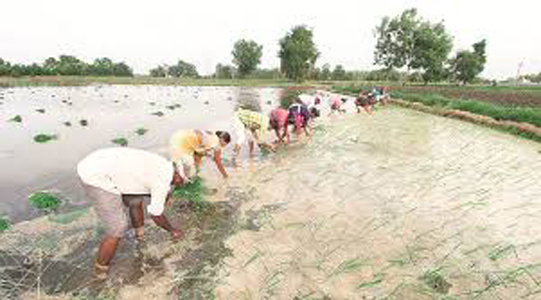NE NEWS SERVICE
NEW DELHI, MAR 24
Opposition Congress on Wednesday urged the government to agree to the demands of farmers who are protesting against the agri laws and “send them home happy”, warning that “making fun” of them would prove very costly to it.
Initiating the debate on the Finance Bill in Rajya Sabha, Congress member Deepinder Singh Hooda questioned the government over its promise of doubling the income of farmers by 2022, alleging that instead of increasing the minimum support price of crops, it was trying to snatch the MSP.
Hooda also demanded that the government express condolences over the “death of over 300 farmers during their agitation” and announce an economic package for their families along with job opportunities.
He also accused the government of following wrong economic policies leading to a decline in economic growth. He said it was the farmers who saved the country and kept the economy alive during the coronavirus pandemic.
Hooda said that in 2015-16, the income of farmers was estimated at Rs 8,000 per month, and by 2022 it should be around Rs 16,000 per month, but it seems to be going down as input costs especially on diesel have risen substantially.
“I urge the government to hear out farmers and show some compassion and sensitivity towards them and send them home happy after agreeing to their demands. The government should announce an economic package for families of those who died during the protests and provide them with employment opportunities. Send the farmers back home happy.
“I urge you with folded hands not to make fun of farmers, as this would prove very costly to you. Please allow farmers to happily return home,” he said.
Hooda said farmers are sitting in protest for over four months now and 300 farmers have died.
“Farmers expected that you would fulfil the promise of doubling their incomes, but what has happened is that you have reduced the agriculture budget by 8.5 percent,” he said.
“You promised to double farmers’ income. Instead of doubling MSP rates, you are trying to snatch it away from farmers. You have attacked the MSP itself and farmers are now fighting to save it,” he also said.
The Congress MP said a farmer was getting an MSP of Rs 1,410 per quintal for paddy in 2015-16, so it should be Rs 2,800 or Rs 3,000 now.
But the MSP of paddy is only Rs 1,868 per quintal, he said and added the same is the case of wheat.
“In these five years, you increased the MSP by 30 percent… If the price is not increasing how will the income increase,” he said, claiming that the price of diesel, an input in agriculture, increased by 94 percent during the period.
The Congress MP also said that because of the government’s economic policies the economy had started to derail well before the outbreak of the COVID-19 pandemic. He said the GDP growth fell to 3 percent from 8 percent in the eight quarters between March 2018 and March 2020.
Hooda said that during the 10-year rule of the Congress-led UPA regime, the average GDP growth was 7.8 percent which came down to 6.8 percent in the first six years of the BJP-led NDA government.
He said there was a decline in the growth rate of consumption, investment, exports as well as government expenditure during the NDA rule compared to the UPA regime. He cited data to support his arguments.
Hooda also quoted views of economists like Nobel laureate Abhijit Banerjee and former RBI Governor Raghuram Rajan to suggest the government was following wrong economic policies.
He said the Indian economy declined at the fastest pace in the April-June quarter and the country also witnessed the highest job loss of around 12 crore during the coronavirus pandemic.
Besides, the gap between rich and poor further widened. To support his point, Hooda said the income of the top 100 wealthiest people increased by 35 percent while the economic growth declined. He also complained that the financial package announced by the government to deal with the impact of the pandemic was significantly low compared to other countries.
Hooda also criticised the government for high taxes on petrol, diesel, and LPG. He said because of the high cost of LPG cylinders, the poor were not able to refill cylinders.









